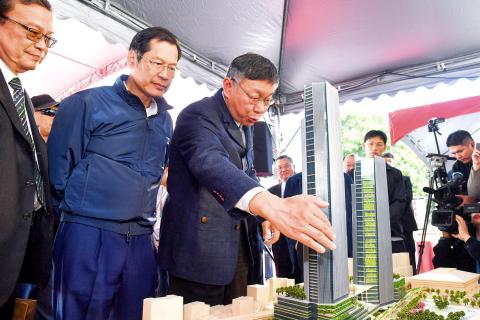A local consortium yesterday signed an agreement with the Taipei City Government to develop a multibillion-dollar complex near Taipei Railway Station, ending more than a decade of uncertainty over the project.
The consortium — comprised of contract computer maker Clevo Co (藍天電腦) and its property affiliate Hongwell Group (宏匯集團) — is to build two high-rise buildings featuring upscale office space, shops and a five-star hotel, Clevo-Hongwell consortium head Kent Hsu (許崑泰) said at a signing ceremony in Taipei.
“It feels like being admitted to college after an outright rejection,” Hsu told reporters.

Photo: CNA
The consortium in December last year lost a bidding race to a foreign group led by Hong Kong-based Nan Hai Development Ltd (南海發展) and Malaysian property developer Malton Berhad by NT$15 billion (US$496.52 million at the current exchange rate).
However, the Ministry of Economic Affairs’ Investment Commission in June disqualified the winners, citing national security concerns.
The city government had tried, unsuccessfully, to find a developer for the project in five rounds of bidding spanning 13 years.
The project would cost NT$60.6 billion, with support from Hsu’s own capital, bank loans and government funds, the tech tycoon-turned developer said.
The mixed-used complex would feature two buildings of 56 and 76 stories intended to renew the area, with easy access to the railway and High-Speed Rail stations, as well as the Taipei Mass Rapid Transit (MRT) system, the airport MRT Line and bus routes, the consortium said.
The towers would have 160,000 ping (528,926m2) of floor space, half of which would be set aside for grade-A office space, while shops would cover 30 percent and hotel rooms would occupy 10,000 ping, Hsu said, adding that there would also be performance halls.
The consortium plans to operate the shopping mall itself and is in talks with international hospitality brands on potential collaboration, he said.
“We will team up with whichever partner can generate the highest return,” Hsu said.
The consortium has promised landlords — the city government and other private owners — monthly rent of NT$2,500 per ping, which means that it needs to charge higher rates to turn a profit after the complex starts operations in 2027, Hsu said.
Local property funds have flowed to office buildings development due to a lack of new products on the horizon, he said, adding that the trend could reverse the landscape and create oversupply in a few years.
The consortium is prepared, as it deems the project a long-term investment that might not generate a profit in the first 10 years of operations, he said.
It would take two years for the venture to clear urban renewal reviews and another four to five years for construction and use license applications, he added.

Sweeping policy changes under US Secretary of Health and Human Services Robert F. Kennedy Jr are having a chilling effect on vaccine makers as anti-vaccine rhetoric has turned into concrete changes in inoculation schedules and recommendations, investors and executives said. The administration of US President Donald Trump has in the past year upended vaccine recommendations, with the country last month ending its longstanding guidance that all children receive inoculations against flu, hepatitis A and other diseases. The unprecedented changes have led to diminished vaccine usage, hurt the investment case for some biotechs, and created a drag that would likely dent revenues and

Global semiconductor stocks advanced yesterday, as comments by Nvidia Corp chief executive officer Jensen Huang (黃仁勳) at Davos, Switzerland, helped reinforce investor enthusiasm for artificial intelligence (AI). Samsung Electronics Co gained as much as 5 percent to an all-time high, helping drive South Korea’s benchmark KOSPI above 5,000 for the first time. That came after the Philadelphia Semiconductor Index rose more than 3 percent to a fresh record on Wednesday, with a boost from Nvidia. The gains came amid broad risk-on trade after US President Donald Trump withdrew his threat of tariffs on some European nations over backing for Greenland. Huang further

CULPRITS: Factors that affected the slip included falling global crude oil prices, wait-and-see consumer attitudes due to US tariffs and a different Lunar New Year holiday schedule Taiwan’s retail sales ended a nine-year growth streak last year, slipping 0.2 percent from a year earlier as uncertainty over US tariff policies affected demand for durable goods, data released on Friday by the Ministry of Economic Affairs showed. Last year’s retail sales totaled NT$4.84 trillion (US$153.27 billion), down about NT$9.5 billion, or 0.2 percent, from 2024. Despite the decline, the figure was still the second-highest annual sales total on record. Ministry statistics department deputy head Chen Yu-fang (陳玉芳) said sales of cars, motorcycles and related products, which accounted for 17.4 percent of total retail rales last year, fell NT$68.1 billion, or

HSBC Bank Taiwan Ltd (匯豐台灣商銀) and the Taiwan High Prosecutors Office recently signed a memorandum of understanding (MOU) to enhance cooperation on the suspicious transaction analysis mechanism. This landmark agreement makes HSBC the first foreign bank in Taiwan to establish such a partnership with the High Prosecutors Office, underscoring its commitment to active anti-fraud initiatives, financial inclusion, and the “Treating Customers Fairly” principle. Through this deep public-private collaboration, both parties aim to co-create a secure financial ecosystem via early warning detection and precise fraud prevention technologies. At the signing ceremony, HSBC Taiwan CEO and head of banking Adam Chen (陳志堅)